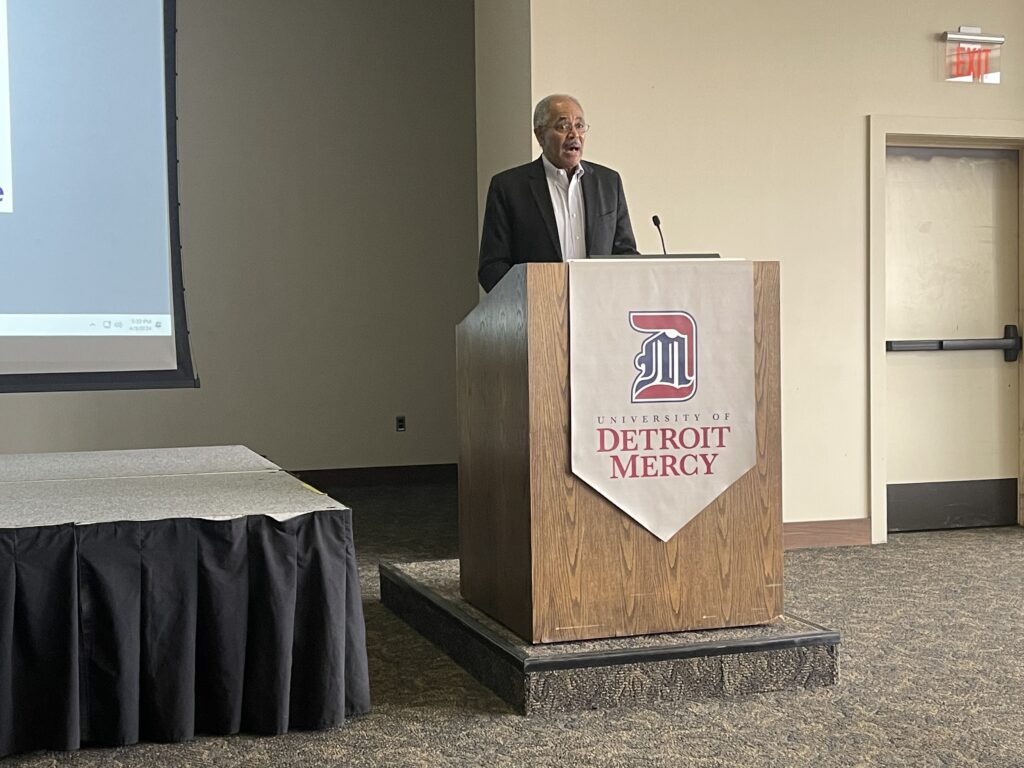
The Department of Religious Studies from the University of Detroit Mercy hosted the 16th Annual Cushing Distinguished Lecture series on April 3 inside the Student Union Ballroom.
This year’s event featured Brian K. Blount, Ph.D., president emeritus of Union Presbyterian Seminary in Richmond, Va., and Charlotte, N.C.
As a renowned scholar of the New Testament, Blount’s work is primarily focused on the Gospel of Mark, the Book of Revelation and areas of cultural studies and hermeneutics. He has authored six books and has also published numerous articles on the subject matter. In 2018, he served as president of the Society of Biblical Literature.
The title of his lecture this year was “I Wonder if Jesus Daydreamed?”
Blount began by questioning whether Jesus daydreamed about saving the world on multiple levels: physically, socially, culturally, politically, ecologically and ethnically.
Blount posited innovative ways of interpreting scripture. Instead of seeking personal redemption, he proposed that Christians should shift their focus to a collective salvation of the world.
He pointed out that, traditionally, most Christians believe Jesus “came to save individuals from their sins; (that) he was on a mission of personal redemption,” – that salvation is oftentimes thought of in individual terms.
Although this interpretation isn’t wrong, Blount contemplated that perhaps Jesus saw his mission differently.
Analyzing language used in scripture, such as Jesus’ blood spilling for “many” during the last supper, Blount identified terms that allude to world salvation.
Instead of personal redemption, he argued that Jesus’ mission might’ve been one of “refashioning the world so individuals can know redemption in it.”
For Blount, a “world saving” is vital to Jesus’ teachings. If Jesus came for only personal redemption, Blount asked, who forgives the collective sins of a country, or for a group of people who marginalize, oppress, kill, and enslave?
In his own daydreams, Blount has saved the world countless times. Yet, in everyday life, he has focused on the wellbeing of himself, his family and livelihood.
However, to “inaugurate the rule of God in this world,” he concluded that Christians should envision and emphasize collective salvation instead of personal redemption.
“The world can be changed according to the scriptural story, (only) if followers believe, followers repent, and followers, like Jesus, daydream,” Blount said.
Blount’s lecture impacted individuals in meaningful ways.
Mateo Six, a senior history major with a religious studies and philosophy minor, valued Blount’s lecture for his unique take on Christian salvation.
“My biggest takeaway from Dr. Blount was that we should embrace a more communitarian approach to repentance, rather than an individualistic one,” Six said.
Professor of Religious Studies and Chair of the Religious Studies Department Todd Hibbard found Blount’s lecture to be engaging and thought-provoking for everyone, including those who are not of the Christian tradition.
“He (Blount) provided a different model for thinking divine activity in Jesus,” Hibbard said. “A model that, ultimately, includes Christian and non-Christian because it begins in God, not a particular religious expression.”
Blount’s analysis inspires consideration of Jesus’ mission from a fresh perspective, leading individuals to imagine what global redemption might look like.
The Annual Cushing Distinguished Lecture is made possible through grants from Dr. Ralph and Dr. Barbara Cushing, alumni of the graduate program in Religious Studies.
The lectures rotate each year on one of three major aspects within religious studies: theology and spirituality, ethics and scripture studies. This year, Blount’s presentation was part of the Jane D. Schaberg lecture in scripture studies.



